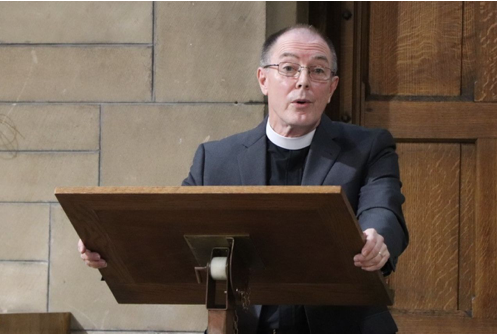Advent: What’s it all about?
The Reverend Dr Michael Hull writes:
\The Season of Advent is upon us once again, having begun with the First Sunday of Advent on 27 November. The Season is one of anticipation as we long for the adventus (Latin for arrival) of Jesus Christ on Christmas Day and on the Last Day. This Season has spawned treasured effects like advent wreaths and calendars that mark the Season’s progress, as well as unwelcome ones like frenzied shopping and ‘Xmas’ sales that mark the regress of our appreciation for what’s vital in Advent.
What’s Advent all about? The Church devised Advent, just as the Church took the decision to celebrate the Nativity of the Lord on 25 December. By the fourth century, both Christmas and Advent (backdated from Christmas) were gradually becoming fixed in the Western Church with a dual emphasis. On the one hand, we celebrate the past by commemorating Jesus’s birth in humility; the Word becomes flesh and dwells among us (John 1.14). On the other hand, we celebrate the future by awaiting Christ’s return in glory when he shall come to judge the quick and the dead (2 Timothy 4.1). Holding these ‘comings’ together is no mean feat. During the Reformation in Britain, Thomas Cranmer crafted a bespoke collect to do just that. Cranmer had been dissatisfied with the collect for Advent 1 in the Sarum Use. He had little to build on because neither the Gelasian nor Gregorian Uses had Advent collects. Cranmer prayed:–
Almighty God, give us grace that we may cast away the works of darkness, and put upon us the armour of light, now in the time of this mortal life, in which thy Son, Jesus Christ, came to visit us in great humility: that in the last day, when he shall come again in his glorious majesty to judge both the quick and the dead; we may rise to the life immortal; through him who liveth and reigneth with thee and the Holy Ghost, now and ever. Amen.
This brilliant collect debuted in the first Book of Common Prayer (1549). It is retained in the latest English (1662) and Scottish (1929) Prayer Books, and in dozens of other Anglican Prayer Books around the world. The collect is closely tied to the readings set for the day, namely Romans 13.8–14 and Matthew 21.1–13.
Romans 13.8–14 is about fulfilling the law through love. St Paul speaks of the radical change required of us, the change that Cranmer underscores in the collect, wherewith we cast off the works of darkness and put on the armour of light. That radical change is rooted in the witness of Jesus speaking of himself as a king (in the language of Isaiah 62.11 and Zechariah 9.9) upon his triumphal entry into Jerusalem. According to Matthew 21.1–13, Jesus powerfully and unapologetically overthrows the hawkers in the Temple. Note that the Church does not begin the Season of Advent with biblical passages concerning the seemingly harmless tot at Mary’s breast, but with the full-grown adult who is consumed by zeal for his father’s house (Psalm 60.9 and John 2.17). We would do well in Advent to kneel before the baby, for in future we shall stand before the man.
Cranmer’s prayer holds together in dynamic tension the self-effacement of God in taking human flesh and nature in the baby Jesus, and at the same time, the stateliness of God in Christ’s second coming as judge. It holds together the present day, that is our mortal life now, and our future life, that is our resurrection to immortal life. Advent is, to be sure, about Christmas Day in the short-haul of relishing the scene at the Manger, yet the short-haul is ordered to the long-haul of basking in the Beatific Vision (1 John 3.2).
Advent reminds us that the time is short. It is a paradox that so many of us waste our time in the things of this world in the very Season that the Church has devised to prepare us for the next world. Cranmer was spot on to beseech God for grace to cast off works of darkness and to put on the armour of light. We’d never get to it ourselves without God’s help. And, ultimately, that is what Advent is all about: preparing for God’s coming to us full of grace and truth (John 14.1). By God’s grace ‘a virgin shall be with child, and shall bring forth a son, and [we] shall call his name Emmanuel, God with us’ (Matthew 1.23). If Advent is about anything at all it is about imitating Jesus’s humility today to share in Christ’s glory at the Last Day for ‘we must all appear before the judgment seat of Christ’ (2 Corinthians 5.10).

The Reverend Dr Michael Hull has been an Assistant Priest at St Vincent’s since 2015. He is also Director of Studies for the Scottish Episcopal Institute
